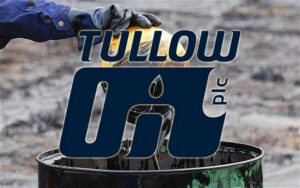Special topics
 Tullow Oil recorded a loss in its operations for last year, a situation that is reflected by the firm’s 27 percent decline in revenue.
Tullow Oil recorded a loss in its operations for last year, a situation that is reflected by the firm’s 27 percent decline in revenue.
The loss was influenced by some 1.6 billion Ghana cedis write off and impairment charges which was mainly impacted negative by the decline in crude oil price.
The oil explorer’s 2015 financials were released Wednesday and shows that the loss after tax recorded was an improvement compared to the 1.6 billion dollars recorded in 2014.
Tullow Oil ended the year with a net debt of 4 billion dollars with a significant facility headroom and free cash of 1.9 billion dollars.
The exploration company puts end of year average crude oil production for the jubilee field at around 102, 600.
A stable rate of gas offtake has been achieved following final commissioning of the onshore gas processing plant in March 2015, averaging around 90 mmscfd in the fourth quarter of the year.
This strong gas export performance significantly reduced the requirement for gas reinjection at the field. Tullow is forecasting Jubilee 2016 average production to be around 101,000 bopd gross (net: 36,000 bopd).
This reflects the impact of a planned two week FPSO maintenance shutdown scheduled for March 2016 and a period of reduced water injection capacity during the first half of the year which is currently being addressed.
During the year, Jubilee Phase 1A drilling and completions continued with two oil producers coming on stream in September and December and a water injector which has yet to be completed. With the Phase 1A investment programme nearing completion, Tullow and partners submitted the Greater Jubilee Full Field Development (GJFFD) Plan in December 2015 and discussions are ongoing with the Government regarding its progress.
This project, to extend field production and increase commercial reserves, has been redesigned given the current environment to reduce the overall capital requirement and allow flexibility in the timing of the capital investment. During 2016 and beyond, a continued focus on cost reduction opportunities and the careful balancing of future capital investment initiatives, including infill drilling as part of the GJFFD, will be key as Tullow seeks to ensure maximum return on investment from this world-class oil field.
Tullow ended last year spending about 1.7 billion dollars on infrastructure projects.
The oil exploration firm is however planning to cut this to about 900 million dollars this year, and further down to 300 million dollars by 2017 if the current challenges with crude oil persists. TULLOW is looking at an average crude oil production for 2016 to reach about 80 thousand barrels.
According to the Chief Executive of TULLOW, Aiden Heavey the plan now is to concentrate on low cost oil production to help mitigate the negative impact of declining crude oil prices on its operations.
On activities of the TEN, field, TULLLOW noted that, the field continuous to make excellent progress, is over 85% complete, and remains within budget and on schedule for first oil between July and August 2016. To date, all the key milestones of the project have been met, including the sailaway of the TEN FPSO from Singapore to Ghana on 23 January 2016.
The vessel sailed with almost zero “carry over”, which means that only 2,000 man hours out of a total 17 million man hours of work remain to be completed during the vessel’s journey to Ghana, a very significant industry achievement.
Arrival in Ghana is expected to be in early March and the vessel will move directly to the installation phase where it will be fixed to the seabed using pre-installed anchor chains and piles. This is followed by the hookup of subsea facilities to the FPSO via flowline risers and control umbilicals, much of which has also been pre-installed.
The eleven pre-drilled wells are now being completed with the sixth completion under way. The integrated facilities will undergo final commissioning and testing during the second quarter and following start-up, a gradual ramp up in production towards plateau is anticipated during the second half of 2016. Tullow estimates that TEN average productions in 2016 will be around 23,000 bopd gross (net: 11,000 bopd).
The overall gross capex cost of the development remains at around $5 billion, without FPSO lease costs. Total gross capex to first oil is expected to be around $4 billion after which the remaining capex is largely associated with the drilling and completion of an additional 13 wells. The export of associated gas from the TEN field is scheduled to start up one year after first oil.
Tullow is guiding 2016 net capex for the development to be around $600 million with approximately 75% being spent in the first half of the year in preparation for first oil.
In April 2015, the Special Chamber of the International Tribunal of the Law of the Sea (ITLOS) in Hamburg rejected Côte d’Ivoire’s request that Ghana be ordered to suspend all oil exploration and exploitation in the disputed zone including the TEN Project. ITLOS ordered a number of provisional measures which both Ghana and Côte d’Ivoire are required to comply with; including continued cooperation and ‘no new drilling’ until ITLOS gives its decision on the maritime boundary dispute which is expected in late 2017. It is therefore assumed that development drilling will not recommence until the ITLOS proceedings have completed.
– Source: http://www.myjoyonline.com/business/2016/february-10th/tullow-suffers-1bn-loss-for-2015.php